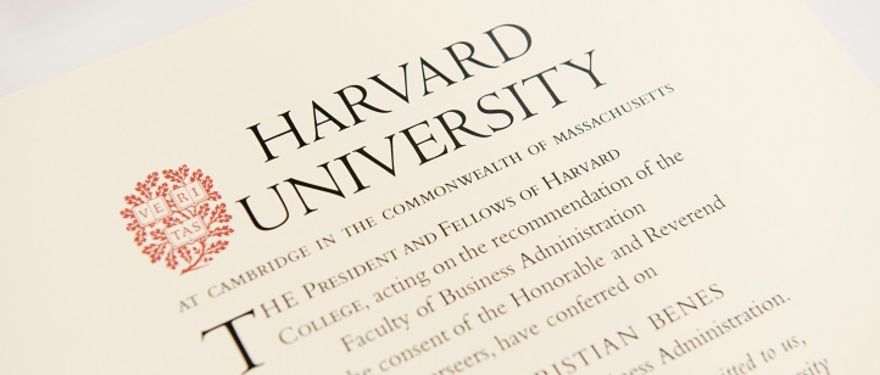Every now and again we have some really big news to share with prospective students. This week’s announcement about the new MS/MBA: Engineering Sciences joint degree was no exception.
In a previous post we outlined some of the program basics, and you can find all the information you’ll need on the program website.
As an Admissions team we were curious to learn more about the impetus behind creating this degree, the kinds of candidates it will attract, and what its graduates might be expected to go on and do. We had the chance to connect with HBS faculty co-chair Professor Tom Eisenmann to learn more.
Professor Eisenmann chairs the HBS Rock Center for Entrepreneurship and leads a January Term Startup Bootcamp for first-year MBAs. In recent years, Eisenmann has served as Chair of Harvard's MBA Elective Curriculum—the second year of the MBA Program—and as course head of The Entrepreneurial Manager, taught to all 900 first-year MBA students.
Here’s what Professor Eisenmann had to say about the new joint degree.
Why is Harvard launching this program now?
“The world needs more leaders with a deep understanding of technology and management. The program aims to help fill that gap by educating future leaders of technology ventures. The program will deepen graduates’ understanding of engineering, build their design skills, and provide them with a strong foundation in general management.”
What types of individuals are you targeting?
“First and foremost, we want students who aspire to lead technology ventures. These individuals love to solve hard problems and to build, and they have entrepreneurial drive. Applicants must also have an undergraduate degree in engineering, computer science, or a related field. Likewise, they must have at least two years of full-time work experience—ideally, designing and/or developing technology-intensive products.”
Is there a competitive advantage to pursuing a degree program like this in Boston?
“Boston ranked first among 25 U.S. cities in a study conducted by global incubator 1776 and the U.S. Chamber of Commerce Foundation, measuring key indicators of entrepreneurship and innovation. Boston is second only to Silicon Valley in terms of venture capital invested per capita. Boston-area research universities spend $2.6 billion annually on R&D. No region surpasses Boston in life sciences: a steady stream of inventions comes from Harvard’s hospitals, Harvard Medical School, SEAS, MIT, big companies such as Genzyme, Biogen, Vertex, and Boston Scientific, and scores of startups.
For a student who aspires to learn about technology and to someday lead a technology venture, Boston is a terrific place to study.”
What will graduates of this program go on to do?
“Program alumni will lead technology ventures. Immediately upon graduation, we expect that many MS/MBAs will launch their own startups. Others will manage the design and development of technology-intensive products—as product managers and engineering team leads in established tech companies, and in similar or more senior roles in startups. Upon graduation, MS/MBAs should also be well trained for positions in design consulting firms.”
Why did you want to become involved in this joint degree program?
“I love creating courses: I've launched or revamped ten MBA courses at HBS. I especially enjoy building project-based courses that use a learning-by-doing approach. My colleagues at SEAS are great at that, so I look forward to collaborating with and learning from them. I also love working closely with aspiring student entrepreneurs on their startups; it's really rewarding to watch their ventures come to life. For all these reasons, I'm excited about teaming up with SEAS faculty to build a joint degree program that blends engineering, design, and management and trains future leaders of technology ventures."
What advice do you have for potential applicants?
“For someone who aspires to launch a startup but is still searching for a concept, graduate school is a terrific place to test ideas, acquire necessary knowledge and skills, and build a professional network. Launching a technology venture is a design process: its leaders need to balance tradeoffs between product quality, cost, and time to market. They also need to formulate a viable business model and build an organization that can deliver value. This takes training in both design methods and in business fundamentals.
With respect to those fundamentals, there's a lot to learn about marketing, finance, and managing teams. You can acquire the necessary knowledge and skills to launch a new venture on the job, but success requires having the right mentors and advisors—and some time to step away from day-to-day demands to learn from them. Graduate school concentrates this training, ensures that you learn what you need to know, and—in a program like ours—provides lots of opportunities to build skills and move your venture concept forward at the same time."
Click here to learn more from Professor Eisenmann’s co-chair at SEAS – Professor Rob Howe.
For additional information about program prerequisites and the application process please visit the MS/MBA: Engineering Sciences website.

